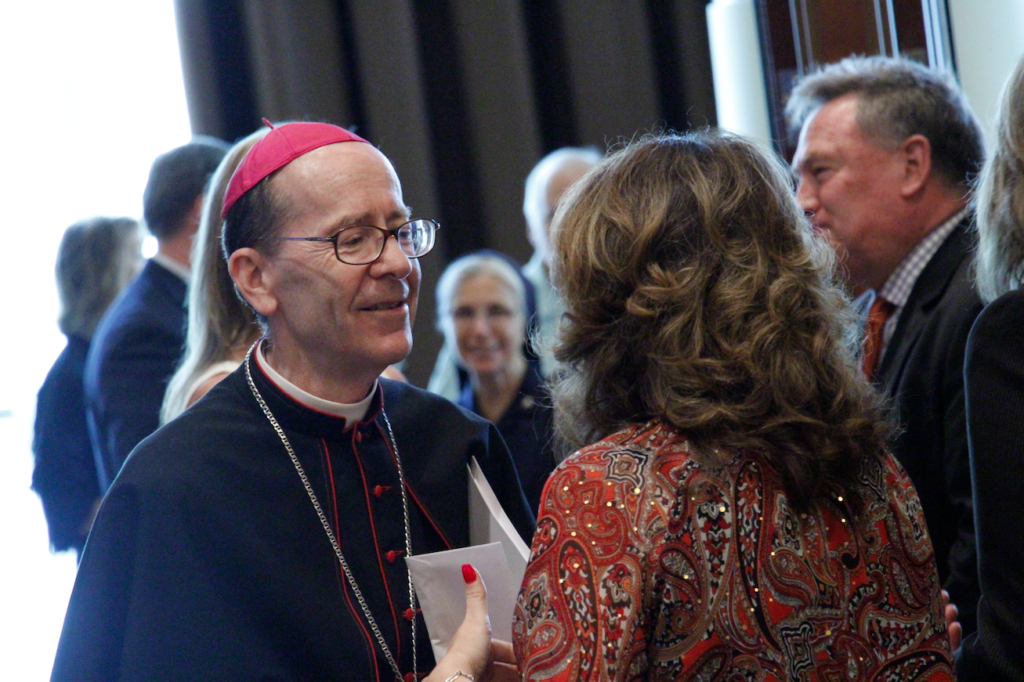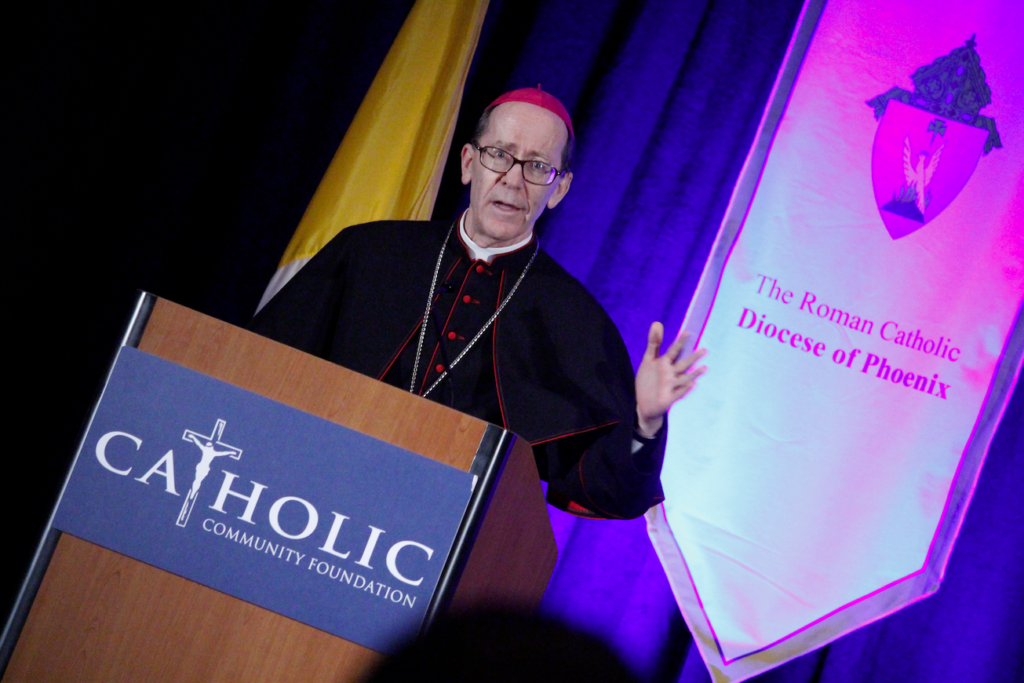Five cantors from Ss. Simon and Jude Cathedral offered not just an audible, but a visual preview of the third annual State of the Church address that Bishop Thomas J. Olmsted delivered Sept. 21.
Cantors from @SSJCathedral sing at #bishopaddressphx pic.twitter.com/R7LJ9uBsfU
— The Catholic Sun (@thecatholicsun) September 21, 2016
Their acapella version of “Misericordes sicut Pater” — Latin for “Merciful Like the Father” — mirrored the title and refrain of the official hymn that is also the Latin theme for the ongoing Jubilee Year of Mercy. Such became a clear guiding principle within the bishop’s 45-minute address at the Sheraton Grand Hotel in downtown Phoenix.
The ballroom full of ordained and lay leaders from local parishes, apostolates and domestic churches didn’t know it yet, but each cantor also visibly foreshadowed five examples Bishop Olmsted would give for how the rich mercy of God is restoring human dignity. By and large, each one shone a bright light on work already being carried out right here in the Diocese of Phoenix.

The bishop cited a healing ministry, aptly named “Restore Dignity,” as one way mercy is at work. The new initiative uses “Grief to Grace” retreats to help survivors of trauma and abuse acquire the tools and support they need to heal and “to understand that their true identity lies in being beloved sons and daughters of God,” the bishop said.
He spoke in depth about the effect his nearly year-old apostolic exhortation, “Into the Breach,” had on men and thereby marriage and family relationships worldwide. The rediscovery of the freedom through the sacrament of Confession and the number of young Catholics “unabashedly rejoicing in their faith” — from the Olympic stage to local Congresos in Spanish and English, campus life and Young Catholic Professionals — also give clear evidence of the rich mercy of God at work today, Bishop Olmsted said.
So does data showing the many Muslims coming to faith in Jesus Christ. Among their reasons: seeing a Christian’s love for all people including enemies, learning that such a call is Biblically-inspired, wanting to apologize to Christian neighbors for terrorist acts and being attracted by the beauty of Divine Mercy, and knowing the Qur’an portrays Jesus as a prophet who heals and cures.
When they learn that Jesus goes as far as suffering an unjust death to rescue sinners, redeem a broken world “and to reveal the love of God the Father, their hearts are deeply moved,” the bishop said. Either way, Christian witness, especially of those who are prayerful rather than revengeful against enemies, exudes the grace to overcome evil with good, he said in an address that interwove Scripture, hinted at personal humility and presented papal precedence of promoting the Church’s “medicine of mercy” as early as the Second Vatican Council.


The bishop didn’t speak in a vacuum either. Though not the focus of his talk, Bishop Olmsted cautioned ignoring the “many dark and discouraging things” of today.
“If we are to be a people of mercy, we need to acknowledge sin and evil. If we are to be peacemakers, we must understand war,” the bishop said. He named a “spiraling increase in acts of terrorism and violence” in the last nine months and said he was sure the crowd of all ages could easily add to the list of woes.
“But, let us trust that, when God destined you and me to live here and now, to bear joyful witness to Him here and now, He did this for good reason,” the bishop said.
Daniel Rivera took those words especially to heart. A junior and a theology major at Benedictine University at Mesa, he attended this year’s address for the first time — along with nine other students, their chaplain and the president of student life. They came eager to be more involved with the diocese, grow in their faith and strengthen their own leadership skills within the Church.
Catholic Student Association members, Chaplain and Associate VP representing #BenUMesa at #bishopsaddressphx! pic.twitter.com/7249OoB1h3
— BenU Mesa Admissions (@MesaAdmissions) September 21, 2016
Among Rivera’s takeaway points was the bishop’s reminder of his role in God’s Divine plan “to be a witness through all the chaos in the world.”
Jill O’Sullivan from St. Thomas the Apostle expected the bishop’s talk to transfer to her family’s dinner table later that night. As a member of Phoenix’s Catholic Leadership Circle, supporting the future of the Church starts with a natural comfort to discuss the successes and needs of the local Church.
The 400 or so people gathered for the bishop’s address learned early on that human discussion, prayerful dialogue and practical support help the Church move forward. Fr. Antony Tinker, FHS, who offered the lunch blessing, wasn’t even associated with Phoenix two years ago, but happened to catch Bishop Olmsted’s inaugural address on YouTube.
In it, the bishop expressed confidence that the Holy Spirit will help establish a Catholic presence at Grand Canyon University. Fr. Antony, recently incardinated in Phoenix as a Franciscan Friar of the Holy Spirit, helped bring the community here. Some of their priests began serving GCU this month.
Always a blessing to see @BishopOlmsted! Beautiful State of the Church address!! #becomefire #FHS pic.twitter.com/EoZCWhca9m
— Franciscan Friars HS (@BecomeFire) September 22, 2016
Rick Frisch, president and CEO of the Catholic Community Foundation, began coordinating the addresses and regular “Close Encounter” gatherings to create additional avenues for the bishop to evangelize in a more personal way.
Frisch found the bishop “really comprehensive about the topic of mercy and how it applies to what we personally do every day, how organizations are built and that expectation of mercy.”
Bishop Olmsted closed out by challenging the crowd to consider what God’s mercy is empowering them to be and do and to forever sing the rich mercy of God.
Frisch said the more bishop is out talking about these important spiritual values, the better his people become.
More from the State of the Church Address
Full address





